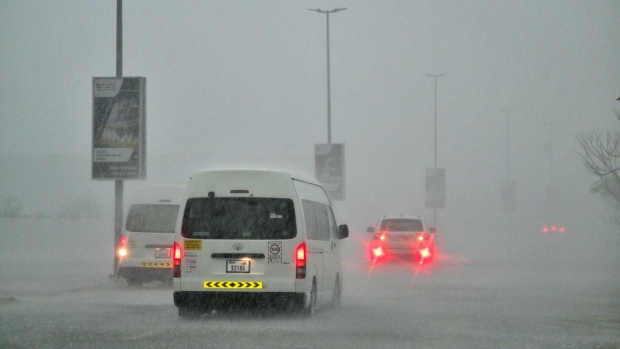Apr 16, 2024
Dubai Grinds to Standstill as Cloud Seeding Worsens Flooding
, Bloomberg News

(Bloomberg) -- Torrential rains across the United Arab Emirates prompted flight cancellations, forced schools to shut and brought traffic to a standstill.
The floods came after one of the worst storms in decades. The government had seeded clouds in the preceding days, though meteorologists said it was unlikely that had a significant impact on the rainfall. The UAE has been carrying out seeding operations since 2002 to address water security issues, even though the lack of drainage in many areas can trigger flooding.
The Gulf state’s National Center of Meteorology dispatched seeding planes from Al Ain airport on Monday and Tuesday to take advantage of convective cloud formations, Ahmed Habib, a specialist meteorologist, said Tuesday. The NCM on Wednesday said the seeding had taken place on Sunday and Monday, and not on Tuesday. Cloud seeding involves implanting chemicals and tiny particles — often natural salts such as potassium chloride — into the atmosphere to coax more rain from clouds.
With global warming threatening a surge in heat-related deaths in the UAE, Dubai’s media office on Tuesday dubbed the downpours “rains of goodness,” despite flooded houses and overflowing swimming pools.
The latest storms followed heavy rains earlier this year, according to Habib at NCM. The seeding planes have flown seven missions, he added.
“For any cloud that’s suitable over the UAE you make the operation,” he said.
The rain forced Dubai International Airport, one of the world’s busiest, to suspend operations for 25 minutes on Tuesday, and disruptions continued into Wednesday.
“Operations continue to be significantly disrupted at Dubai International due to heavy rain and flooding,” a spokesperson for the airport told Bloomberg Tuesday. Emirates, one of the world’s biggest airlines suspended passenger check-ins for the day on Wednesday.
The UAE government issued warnings ahead of the heavy rains, asking people to stay at home and only leave “in cases of extreme necessity.” It later extended remote working until Wednesday for all federal employees.
People took to social media to share updates on the aftermath of the weather. Some videos showed cars being swept off roads, while another showed the ceiling of a shop collapsing as water inundated one of Dubai’s most popular malls. The emirate’s metro was disrupted.
Residents had to bail out apartments and underground car parks were flooded, and some buildings suffered power outages. Roads in Abu Dhabi were also flooded.
In neighboring Oman, at least 18 people have died in recent days as the heavy rains caused flooding, AP reported, citing a statement from the country’s National Committee for Emergency Management.
--With assistance from Leen Al-Rashdan.
(Corrects headline and second paragraph of story published April 17 to clarify there’s no evidence the cloud-seeding had significant impact on the floods.)
©2024 Bloomberg L.P.